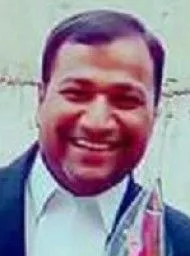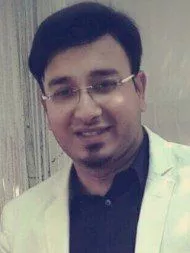
Advocate Shrikant Laxman Tambe
Advocate Shrikant provides services in various fields of Banking/Finance Matters, Civil Matters, Family Matters, Criminal Matters, Insurance Matters and drafting and vetting of various agreements and documents.
Advocate Shrikant enrolled with the Bar Council of Maharashtra and Goa in 2006. He is a member of Pune Bar Association.
Enrollment Number : MAH/4236/2006
- District Court, Pune
- Family Court, Pune
Recently Contacted Lawyers in Pune

Advocate Ravi Jadhav

Advocate Ganesh Arjun Ranadive

Advocate Khursheed Anwar Qureshi

Advocate Rishabh Gandhi

Advocate Clerence Pereira

Advocate Sudhir Reddy

Advocate Minakshi Bapu Ovhal Dakhane

Advocate Shweta Joshi

Advocate Shweta Pandey
Popular Reviews
There are no reviews yet for Advocate Shrikant Laxman Tambe. Please consult the lawyer through LawRato if you wish to leave a review.
Questions Answered by Advocate Shrikant Laxman Tambe
Q: Advice in case of death of account holder and Nominee issue.
My Husband's paternal uncle has made an FD of Rs 20 lakh and have nominated my husband in it. He expired in Jan'17. When my husband approached the bank with his uncle's death certificate, they informed us that in the column of nominator's signature, his uncle's signature is missing. When they went to bank for nomination the bank's executive has guided them to fill and sign the form. Where all the KYC form were filled and signed by my husband and his uncle except the DA1 form. This is due to negligence of the bank's executive. Now the bank is denying to give the money and not acknowledging their mistake. Pls suggest.
Advocate Shrikant Laxman Tambe answered
As you are aware, in the case of deposit accounts where the depositor had utilized the nomination facility and made a valid nomination or where the account was opened with the survivorship clause ('either or survivor', or 'anyone or survivor', or 'former or survivor' or 'latter or survivor'), the payment of the balance in the deposit account to the survivor(s)/nominee of a deceased deposit account holder represents a valid discharge of the bank's liability provided :a. the bank has exercised due care and caution in establishing the identity of the survivor(s) / nominee and the fact of death of the account holder, through appropriate documentary evidence;b. there is no order from the competent court restraining the bank from making the payment from the account of the deceased; andc. it has been made clear to the survivor(s) / nominee that he would be receiving the payment from the bank as a trustee of the legal heirs of the deceased depositor, i.e., such payment to him shall not affect the right or claim which any person may have against the survivor(s) / nominee to whom the payment is made.2.2 It may be noted that since payment made to the survivor(s) / nominee, subject to the foregoing conditions, would constitute a full discharge of the bank's liability, insistence on production of legal representation is superfluous and unwarranted and only serves to cause entirely avoidable inconvenience to the survivor(s) / nominee and would, therefore, invite serious supervisory disapproval. In such case, therefore, while making payment to the survivor(s) / nominee of the deceased depositor, the banks are advised to desist from insisting on production of succession certificate, letter of administration or probate, etc., or obtain any bond of indemnity or surety from the survivor(s)/nominee, irrespective of the amount standing to the credit of the deceased account holder.
Q: Need help regarding withdrawing case
On 9th May 2016 i filled a case under IPC 420,34 against my 3 friends for cheating me for 15Lacs. Case charge sheet hasn't been submitted to court yet. they are underground now. contacted me through third person & they are ready to refund my amount by DD to me & requesting me to withdraw the case. So how can i withdraw the case without much interference of Police???
Advocate Shrikant Laxman Tambe answered
Sec 420 of IPC is a compoundable office and you can withdraw the matter with due permission of the court, you have to make an application to the court but all this has been done after filing the chargesheet before that you can not do the same
Q: How to regain possession of flat
builder has sold the flat to me. Full consideration paid and documents got registered also. but he sold and registered it again to another person and gave possession to him. with the same builder another flat matter he gave the allotment letter and recd. almost full consideration from me but sold the flat to another person and gave possession to him. I lodged FIR against the builder in nalasopara police station on 07/01/2017 but police is not taking any action. What is to be done.
Advocate Shrikant Laxman Tambe answered
you can go against builder for cancellation of sale deed with another person in civil court or you can go to consumer court too, specific performance suit u can initiate against builder as well as yo can claim compensation from consumer court
Q: Brother's not willing to give share in ancestral property how to claim
We four brothers have ancestors land and a house built on it in the year 1990, but in the year 1993-94, Grampanchayat had registered only two brother's name for collection of housing tax and hence the 8-A extract is in the name of only two brothers. This registration was done without me and my brother's knowledge. As a result they both are not willing to give us our share in the property. The 7/12 Extract is in the name of all our four brother's name. Can you please advise if the name in 8-A extract is proof / document of the ownership of the land and house built on it? If I go to the court is there any chance I will get our share back? Note: The City Survey document says that the house was built by our father in 1990, whereas the two brothers clam it was built by them. Even if they prove it is built by them, is there any possibility that I can get my share in the land at least, as the 7/12 extract have all four brothers name on it? Please advice.
Advocate Shrikant Laxman Tambe answered
The word coparcener has been used very widely in relation to the Hindu law and the HUF. In relation to HUF property, a coparcener is a person who acquires a right in the ancestral property by birth and a person who has a right to demand partition in the HUF property. Prior to the amendments made by the Hindu Succession (Amendment) Act,2005, only male members of a family had a right to the Ancestral property by birth and they were only entitled to demand partition in the HUF Property and thus only male members were called coparceners. Under the 1 lindu law, it has also been said that the male members upto three lineal descendants are coparceners meaning a family consisting of father, his son, son’s son and son’s grandson are coparceners in the Hindu property. The genesis of coparcenary thus is a common male ancestor with his lineal descendants in the male line within three degrees excluding him e.g. his son, son’s son and son’s grandson. This genesis is so long as the male ancestor is alive and after his death, the three degrees can consist of collaterals such as brothers, uncles, nephews and cousins etc. lhis position is 1so subject to the amendments made by Hindu succession (amendment) Act, 2005 whereby even daughters have been included within the term coparceners and all references to son shall equally apply to daughters also.Any member other than the above who were not entitled to right in the HUF property by birth or who did not have a right to demand partition were not coparceners and were simply members who had a right of maintenance out of the 1-hindu family property.However, with the amendments made by the 1 hindu Succession (Amendment) Act, 2005 a daughter has also been given equal rights as son and she has also become a coparcener in the Hindu property and she has also got rights over the Hindu property to demand partition. Form the above it follows, that all the, coparceners are members of 1 IUF, but not the vice versa i.e., a member of HUF may not necessarily be a coparcener say a daughter in law in the Ilindu family.As we have seen in earlier Chapters, Coparcener in relation to a Joint 1-lindu family means a person who is entitled to demand partition of his share in the Coparcenary property.
Q: How to initiate divorce proceedings
Amar husband amar sathe sobsmy jogra & osanti & mardhor kore.. Tai Ami AMR husband k divorce dite chain.
Advocate Shrikant Laxman Tambe answered
The Hindu Marriage Act-1955 has given the legal provision for divorce on basis of cruelty under section – 13(1)(ia) as follows;“Any marriage solemnized, whether before or after the commencement of this Act, may, on a petition presented by either the husband or the wife, be dissolved by a decree of divorce on the ground that the other party has, after the solemnization of the marriage, treated the petitioner with cruelty”.On basis of this section we can explain this legal basis for the divorce as anybody who is getting suffer from the other party in physical manner or a mental torture or any other type of harassment then the other can reach to the court with this base and claim for the divorce. And there are various cases where courts held that the intention to be cruel is not an essential element of cruelty as envisaged under this section.
Frequently Asked Questions about Advocate Shrikant Laxman Tambe
Can Advocate Shrikant Laxman Tambe represent me in court?
Yes, Advocate Shrikant Laxman Tambe can represent you in court. The lawyer is trained to present your case in the most effective way possible.
What should I bring to my initial consultation with Advocate Shrikant Laxman Tambe?
When you meet with Advocate Shrikant Laxman Tambe for an initial consultation, it is important to bring any relevant documents or information with you. This may include documents related to your legal issue, such as contracts or court orders, as well as any other relevant information, such as a list of questions or concerns you have about your case.
How do I prepare for my initial consultation with Advocate Shrikant Laxman Tambe?
Before your initial consultation with Advocate Shrikant Laxman Tambe, it can be helpful to think about the specific legal issue you are facing and any questions or concerns you have about your case. You should also gather any relevant documents or information that you think may be helpful in understanding your situation.
What should I expect during my initial consultation with Advocate Shrikant Laxman Tambe?
During your initial consultation with Advocate Shrikant Laxman Tambe, you can expect to discuss the specific legal issue you are facing and the details of your situation. Lawyer will ask you questions to get a better understanding of your case and will provide you with information about your legal options and any potential outcomes.
How do I communicate with Advocate Shrikant Laxman Tambe?
It is important to communicate with Advocate Shrikant Laxman Tambe regularly to stay updated on the progress of your case and to discuss any new developments or concerns you may have. You can communicate with the lawyer through phone calls, emails, or in-person meetings.
How much does it cost to hire Advocate Shrikant Laxman Tambe?
The cost of hiring Advocate Shrikant Laxman Tambe can vary widely. Some lawyers charge hourly rates, while others charge a flat fee for their services. Some also offer free initial consultations to discuss your case. Kindly contact the lawyer directly to enquire about the fee.



 643+ Lawyers are online
643+ Lawyers are online